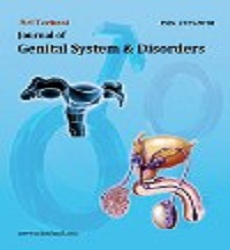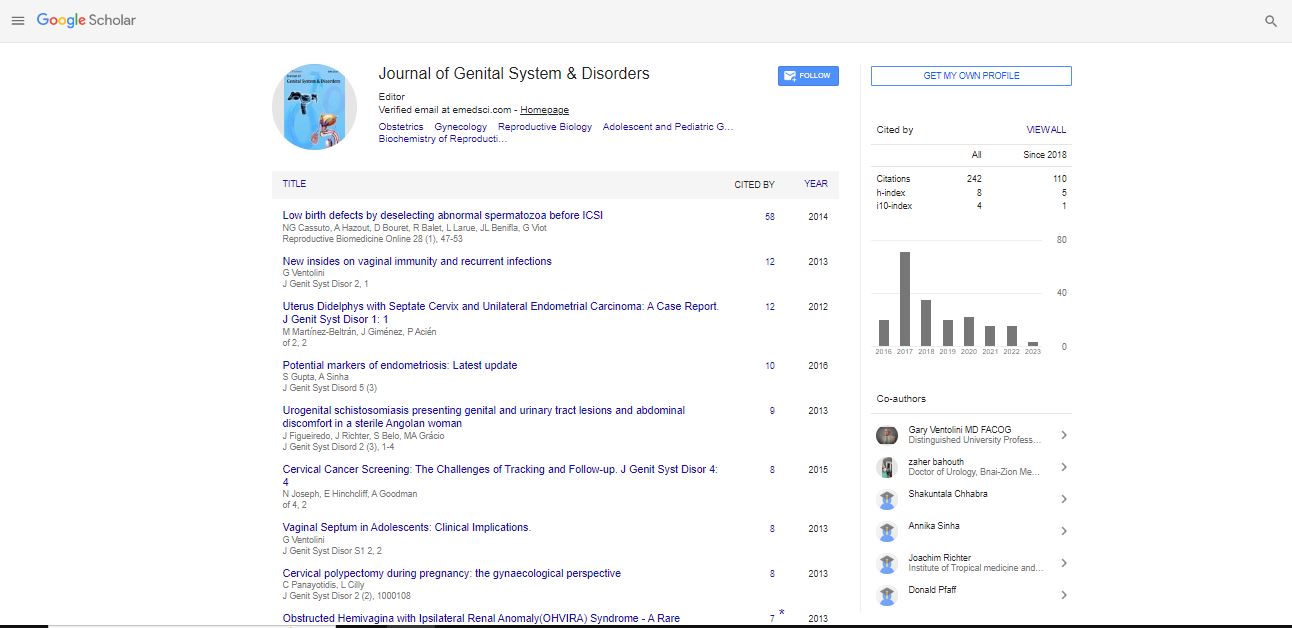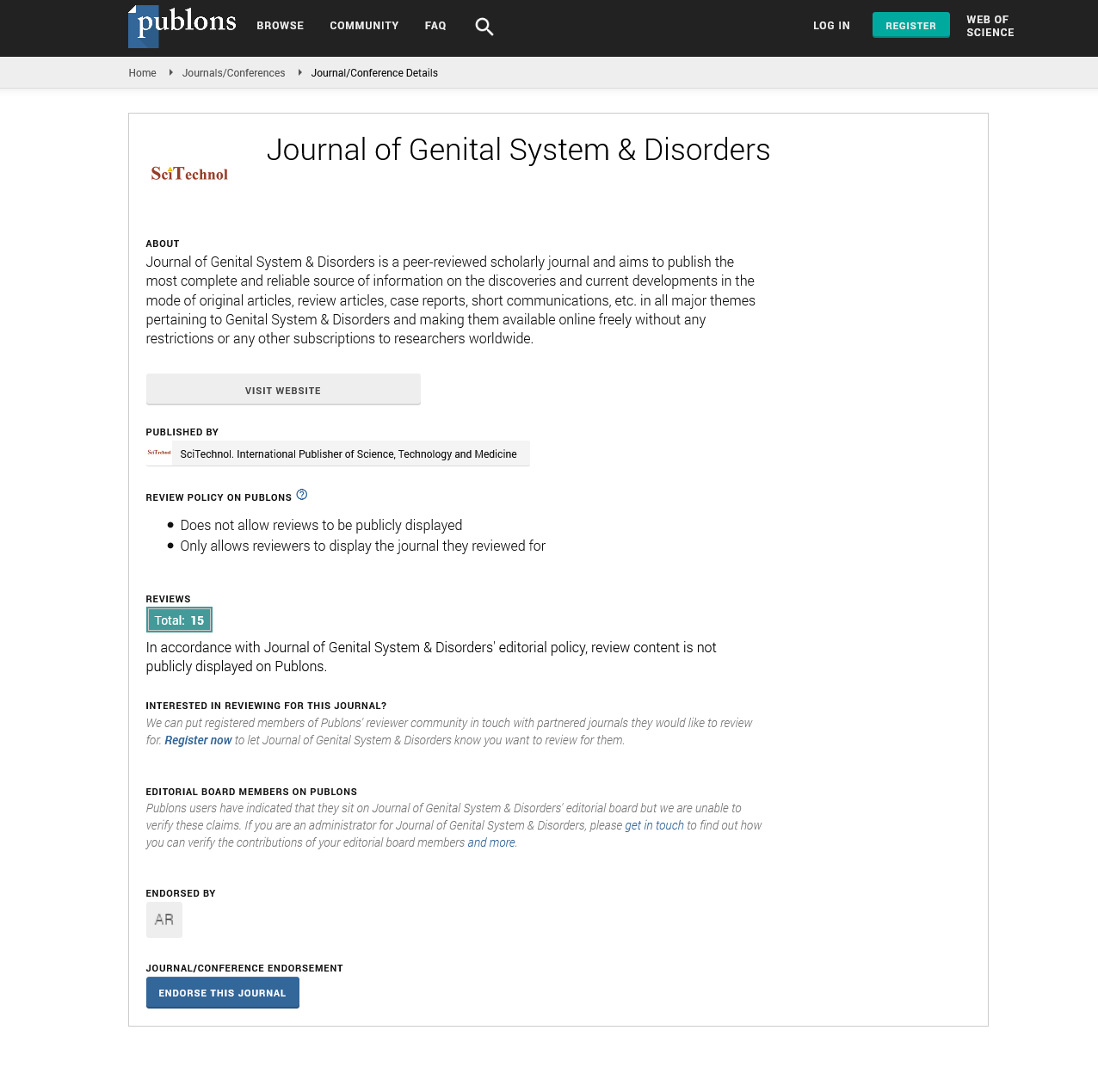About the Journal of Genital System & Disorders

Journal of Genital System & Disorders is a peer-reviewed scholarly journal and aims to publish the most complete and reliable source of information on the discoveries and current developments in the mode of original articles, review articles, case reports, short communications, etc. in all major themes pertaining to Genital System & Disorders and making them available online freely without any restrictions or any other subscriptions to researchers worldwide.
Submit manuscripts atOnline Submission Systemor send as an e-mail attachment to the Editorial Office atmanuscript@scitechnol.com
Journal of Genital System & Disorders focuses on the topics that include:
- Reproductive Biology
- Genital Disorders
- Reproductive Endocrinology
- Obstetrics, Gynecology & Andrology
- Genital Oncology
- Reproductive Pathology
- Reproductive Immunology
- Reproductive Science & Therapeutics
- Biochemistry of Reproductive Science
- Urogynaecology
- Reproductive Technology
- Infertility
- Polycystic Ovary Syndrome
- Adolescent and Pediatric Gynecology
The Journal is using Editorial Manager System for quality in review process. Editorial Manager is an online manuscript submission, review and tracking system. Review process is performed by the editorial board members of Journal of Genital System & Disorders or outside experts; at least two independent reviewers approval followed by editor approval is required for acceptance of any citable manuscript. Authors may submit manuscripts and track their progress through the online tracking system, hopefully to publication.
Confirmed SpecialIssues:
- Vaginoplasty
Cervical Pathology & Colposcopy
Cervical Pathology is the science of the causes and effects of diseases related to cervix with laboratory examination for diagnostic purposes. Major diseases of Cervix include: Cervical endometriosis, Ectropion and Endocervicitis.
A Colposcopy is a close-up view of the cervix, vagina and vulva for signs of disease. It is used to detect abnormal cells on the cervix. During a colposcopy procedure, physician uses a colposcope - an instrument that looks like binoculars with a bright light mounted on a stand.
Congenital Anomalies
Congenital Anomalies, often referred to as birth defects/ congenital disorders or congenital malformations, have a variety of causes ranging from pregnancy or birth complications to genetic malformations to viral infections in utero, pregnancy loss and reproductive disabilities.
Polycystic Ovary Syndrome
Polycystic Ovary Syndrome or hyperandrogenic anovulation is the major endocrine disorder in reproduction science with the imbalance of hormones in female caused due to genetic and environmental factors with the formation of large number of cysts.
Reproductive Biology
Reproductive Biology is the science of studying the physiology and development of reproductive system. The study mainly covers areas such as Sex Organs, reproductive endocrinology, infertility etc.
Obstetrics, Gynecology & Andrology
Obstetrics, Gynecology & Andrology are the specific fields of reproductive science.
Obstetrics is the field of reproductive science dealing with childbirth and midwifery.
Gynecology is the major branch of reproductive science dealing specifically with female reproductive system.
Andrology is the major field of reproductive science dealing specifically with male reproductive system.
Genital Oncology
Genital Oncology is a developing field of reproductive sciences which deals with the major fields of genital cancer conditions, treatments and advanced techniques used. Genital oncology covers the areas of Ovarian tumors; Oviductal tumors; Uterine tumors; Cervical tumors, etc.
Genital Disorders
Genital Disorders is the part of reproductive science which covers the various disorders of reproductive system of male and female. It is a rapidly growing field with main emphasis on finding cure and treatment for such disorders.
Reproductive Pathology
Reproductive Pathology is the study of reproductive sciences which majorly consists of pathology history, examination and development of recent trends in pathology discovery of reproduction system.
Reproductive Immunology
Reproductive Immunology is the science of medicine dealing with the correlation of immune system with the reproductive system. Reproductive Immunology is of prime importance during child birth.
Reproductive Science & Therapeutics
Reproductive Science & Therapeutics is the recent advancing field of medical sciences including the various technologies for therapy of reproduction such as Assisted Reproduction, cloning, Implantation techniques etc.
Biochemistry of Reproductive Science
Biochemistry of Reproductive Science is the study of reproduction science dealing with the biological and chemical processes within a human being/organism. Chemistry involves the association of various techniques in reproduction science.
Sex Hormones Replacement Therapy
Sex Hormones Replacement Therapy is the form of therapy in reproduction biology wherein hormones are replaced for the lack or deficiency from the required amounts or as a substitute for naturally occurring hormones. The therapies widely used in Hormone replacement therapy include, replacement for Menopause, gender and androgens.
Infertility
Infertility is the major field in reproduction biology which deals with living organisms incapability of reproducing by natural means. Various Infertility evaluating and treatment techniques are availed now-a-days which majorly include assisted reproduction.
Urogynaecology
Urogynaecology is the field of reproductive medicine wherein the combination of urology and gynecology surgical aspects are detailed along with the evaluating techniques for the conditions, using modern techniques.
Adolescent and Pediatric Gynecology
Adolescent and Pediatric Gynecology is the field of reproductive medicine which majorly deals with the conditions of the uterus, ovaries, vagina and Vulva in babies, children and adolescents.
Sex Organs
Sex Organs are the primary reproductive parts of body constituting majorly of reproductive system involved in sexual reproduction. They are also referred as genitalia or genitals.
Lower Genital Tract Infections
Reproductive Tract Infections (RTIs) include three types of infection: a) Sexually Transmitted Diseases (STDs), such as Chlamydia, Gonorrhea, Chancroid, and Acquired Immunodeficiency Syndrome (AIDS); b) Endogenous Infections, which are caused by overgrowth of organisms normally present in the genital tract of healthy women, such as Bacterial vaginosis or Vulvovaginal candidiasis; and c) Iatrogenic Infections, which are associated with improperly performed medical procedures such as unsafe abortion or poor delivery practices.
Sexual Dysfunction
Sexual Dysfunction or sexual malfunction is a major problem in reproduction due to the difficulty of an individual or couple during normal sexual activity for various reasons connected with the concerned individual or couple.
Reproductive Surgery
Reproductive Surgery is an advancing field in reproduction science wherein the surgery is majorly used in reproduction aspects. Reproductive surgery includes the Minimally Invasive Surgeries, assisted reproduction techniques, vasectomy, Surgical sperm retrieval techniques, etc.
Reproductive Technology
Reproductive Technology is an advancing technology with recent trends for the use in human reproduction. Assisted reproduction is the novel and widely used technique in this field.
2019 Journal Impact Factor is the ratio of the number of citations achieved in the year 2019 based on Google Search and Google Scholar Citations to the total number of articles published in the last two years i.e. in 2017 and 2018. Impact factor gives a measure the quality of the Journal.
If ‘X’ is the total number of articles published in 2014 and 2015, and ‘Y’ is the number of times these articles were cited in indexed journals during 2016 then, impact factor = Y/X.
Fast Editorial Execution and Review Process (FEE-Review Process):
Journal of Genital System & Disorders is participating in the Fast Editorial Execution and Review Process (FEE-Review Process) with an additional prepayment of $99 apart from the regular article processing fee. Fast Editorial Execution and Review Process is a special service for the article that enables it to get a faster response in the pre-review stage from the handling editor as well as a review from the reviewer. An author can get a faster response of pre-review maximum in 3 days since submission, and a review process by the reviewer maximum in 5 days, followed by revision/publication in 2 days. If the article gets notified for revision by the handling editor, then it will take another 5 days for external review by the previous reviewer or alternative reviewer.
Acceptance of manuscripts is driven entirely by handling editorial team considerations and independent peer-review, ensuring the highest standards are maintained no matter the route to regular peer-reviewed publication or a fast editorial review process. The handling editor and the article contributor are responsible for adhering to scientific standards. The article FEE-Review process of $99 will not be refunded even if the article is rejected or withdrawn for publication.
The corresponding author or institution/organization is responsible for making the manuscript FEE-Review Process payment. The additional FEE-Review Process payment covers the fast review processing and quick editorial decisions, and regular article publication covers the preparation in various formats for online publication, securing full-text inclusion in a number of permanent archives like HTML, XML, and PDF, and feeding to different indexing agencies.
 Spanish
Spanish  Chinese
Chinese  Russian
Russian  German
German  French
French  Japanese
Japanese  Portuguese
Portuguese  Hindi
Hindi 

